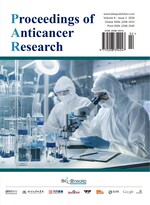Abstract
Objective: To explore and analyze the expression and clinical significance of vascular endothelial growth factor (VEGF), hypoxia-inducible factor 1α (HIF-1α), and metabolic indicators in esophageal squamous cell carcinoma (ESCC). Methods: Sixty ESCC patients admitted to the hospital from October 2021 to October 2023 were selected as the ESCC group. Sixty normal healthy patients from the same period were chosen as the control group. Their serum samples and tissue samples were collected. Metabolic indicators of all study subjects were obtained based on the basic biochemical results upon admission. RT-PCR was utilized to detect the expression of VEGF and HIF-1α in ESCC tissues. Results: The expression of VEGF and HIF-1α in the ESCC T3+T4 group was significantly higher than that of the carcinoma in situ (Tis) group, T1+T2 group, and control group. Furthermore, the expression of HIF-1α was found to be related to the expression of VEGF, showing a significant correlation between the quantities. Significant differences in the levels of metabolic indicators were observed between the ESCC group and the control group (P < 0.05). Conclusion: Metabolic indicators are associated with the onset of ESCC in patients. Abnormal lipid metabolism plays a crucial role in the occurrence and development of tumors. The expression of VEGF and HIF-1α in ESCC tissues significantly correlates with the tumor stage, providing a new reference for the diagnosis and treatment of ESCC.
References
Li X, Yang J, Wang J, 2020, Research Status of Genomics, Proteomics, and Metabolomics Application in Esophageal Cancer Screening and Early Diagnosis. Chinese Journal of Cancer Prevention and Treatment, 27(6): 493–498.
Cui Y, Chen H, Xi R, et al., 2022, Whole-Genome Sequencing of 508 Patients Identifies Key Molecular Features Associated with Poor Prognosis in Esophageal Squamous Cell Carcinoma. Cell Res, 30(10): 902–913. https://doi.org/10.1038/s41422-020-0333-6
Wan P, Shen W, Peng Z, et al., 2022, Characteristic Intestinal Flora and Associated Biomarkers in Esophageal Cancer Based on PacBio SMRT Sequencing. Journal of Environmental and Occupational Medicine, 39(9): 1011–1020. https://doi.org/10.11836/JEOM22065
Yang L, Miao Z, Kang X, 2023, Changes and Clinical Significance of Peripheral Serum VEGF Before and After Chemotherapy in Patients with Esophageal Squamous Cell Carcinoma. Hebei Medicine, 45(21): 3226–3229.
Liu Z, Zhao Y, Kong P, et al., 2023, Integrated Multi-Omics Profiling Yields a Clinically Relevant Molecular Classification for Esophageal Squamous Cell Carcinoma. Cancer Cell, 41(1): 181–195.e9. https://doi.org/10.1016/j.ccell.2022.12.004
Tang L, Liu T, Jia X, et al., 2022, Effect and Prognosis Analysis of Intensity-Modulated Radiotherapy Combined with Concurrent CF Regimen on IGF-1 and VEGF in Esophageal Squamous Cell Carcinoma. Zhongnan Journal of Medical Sciences, 50(2): 245–248.
Chen X, Yu L, Zhou J, et al., 2023, Inhibition of p62 and/or NFE2L2 Induced Autophagy Impaired Esophageal Squamous Cell Cancer Metastasis by Reversing EMT. Gene, 858: 147194. https://doi.org/10.1016/j.gene.2023.147194
Guo J, Alimujiang M, Idelis A, et al., 2023, The Role and Changes of Lymphatic Vessels and Endothelial Cells in Esophageal Cancer’s Lymphatic Metastasis. Chinese Clinic of Thoracic and Cardiovascular Surgery Magazine, 30(5): 766–772.
Chen D, Di Y, 2021, The Influence of Blood Lipid Levels and Metabolic Indicators on the Incidence of Esophageal Cancer. Modern Oncology, 29(21): 3770–3772.
Wang X, Yang H, Fan J, et al., 2023, Exploration of Esophageal Squamous Cell Carcinoma Metabolomic Markers Based on the Lin County Nutritional Intervention Trial Population. Chinese Oncology, 32(2): 154–160.
Li Y, Xing S, Chen F, et al., 2023, Intracellular Fusobacterium nucleatum Infection Attenuates Antitumor Immunity in Esophageal Squamous Cell Carcinoma. Nat Commun, 14(1): 5788. https://doi.org/10.1038/s41467-023-40987-3
Cui S, McGranahan N, Gao J, et al., 2023, Tracking the Evolution of Esophageal Squamous Cell Carcinoma Under Dynamic Immune Selection by Multi-Omics Sequencing. Nat Commun, 14(1): 892. https://doi.org/10.1038/s41467-023-36558-1
Cao Z, Yang J, 2023, The Value of Serum SCC-Ag, VEGF, and UHRF1 Levels in Predicting the Recurrence of Esophageal Squamous Cell Carcinoma After Radical Surgery. Henan Medical Research, 32(6): 1024–1029.
Hua Y, He K, Zhang J, et al., 2023, Effects of High Expression of Hypoxia-Inducible Factors and Angiogenic Factors Induced by Fusobacterium nucleatum on Survival Prognosis of Patients with Esophageal Squamous Cell Carcinoma. Journal of Shandong University (Medical Edition), 61(11): 59–67.
Peng M, Zhou X, Jiang L, 2020, Effect of VEGF and HIF-1? Expression on the Efficacy of Radiotherapy in Patients with Esophageal Squamous Cell Carcinoma. Journal of Practical Cancer, 35(10): 1631–1634.
Liu X, Liu Y, Fan Z, et al., 2022, Expression and Clinical Significance of Hypoxia-Inducible Factor-1? and Vascular Endothelial Growth Factor in Esophageal Squamous Cell Carcinoma Tissue. Journal of Xinjiang Medical University, 45(10): 1099–1103.
